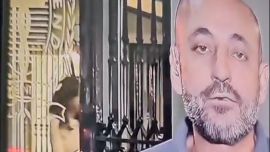Less than two weeks before most presidential elections, voters and investors usually keep their eyes glued to opinion polls. But in Argentina they’ve nearly vanished from the public conversation.
Reasons behind their disappearance are obvious. Pollsters on all ends of the political spectrum badly underestimated the performance of opposition candidate Alberto Fernández in the crucial August 11 primary vote, when he trounced incumbent Mauricio Macri by 16 percentage points.
The absence of data and speculation about the results highlights a growing sense of apathy, given that most analysts and investors believe Fernández has already won, even though Macri is crisscrossing the nation on a marathon campaign tour. Investor spending on expensive polls also dried up after the stunning PASO primary.
Polls “were so wrong, why would you ascribe any credibility to them?” said Walter Stoeppelwerth, chief investment officer of Portfolio Personal Inversiones in Buenos Aires.
Now, “there’s no money for polls and everyone thinks a first-round win is a foregone conclusion,” he added.
In the weeks before the August primary, most polls showed Macri, an investor favourite, trailing Fernández by five percentage points or less, a distance he could arguably overcome in the official vote and a potential November runoff. The president ended up getting hammered and financial chaos ensued.
Backlash
The peso plunged 26 percent in August, bond prices tanked, the government implemented capital controls and investors now see a 92 percent chance of a default in the next five years. Financial markets fear Fernández will undo Macri’s pro-business stance and policy plans, as well as revise a record credit deal with the International Monetary Fund (IMF).
The race has since lost some intensity as a confident Fernández dedicates more time to building his reputation abroad instead of stumping at local events. The first presidential debate on Sunday also had little impact.
Reputable public opinion surveys have disappeared from nightly news shows and aren’t published on newspapers’ front pages – two typical trends in Argentine election cycles. Pollsters concede that they were so far off in the primary, and faced such a backlash, that they’re no longer making surveys public.
“After what happened in the primary, evidently we couldn’t see the difference that there was between the candidates,” said Mariel Fornoni, director of local polling firm Management & Fit, which in past elections published surveys in newspapers like Clarín,. “We’re working for private clients but we’ve decided not to publish any new numbers.”
Fornoni says pollsters faced criticism from both sides of the political aisle after the primary. Macri’s party felt deceived, while Fernández’s camp was upset that it was so underestimated, she said.
After the primary, some investors sought a refund for the remaining surveys they had already paid for, while others said they will be looking at the data but not necessarily trading on it, according to several people who hired polling services and asked to not be named.
Meanwhile, the lack of credible public opinion surveys has also paved way for relatively unknown pollsters to come forward in recent weeks, with some forecasting a greater than 20 percentage point win for Fernández.
Phone surveys
Since 2013, Juan Germano, director of the well-known consulting firm Isonomía, has kept his polls private because his clients pay for the data. While some of Isonomía’s surveys were leaked to newspapers for months before the primary, they’re now nowhere to be found.
Other pollsters note that they relied too much on telephone surveys and not enough on in-person interviews. Some only had land-line telephone data, which was out of sync with many voters that only use mobile phones. They say conducting more thorough surveys would’ve required a much larger budget.
“I don’t remember another election when there were so few polls,” said Lucas Romero, director of polling firm Synopsis, which is only providing information now to private clients. “After what happened, we logically did our own internal analysis to evaluate what could have failed.”
by Patrick Gillespie, Bloomberg






















Comments